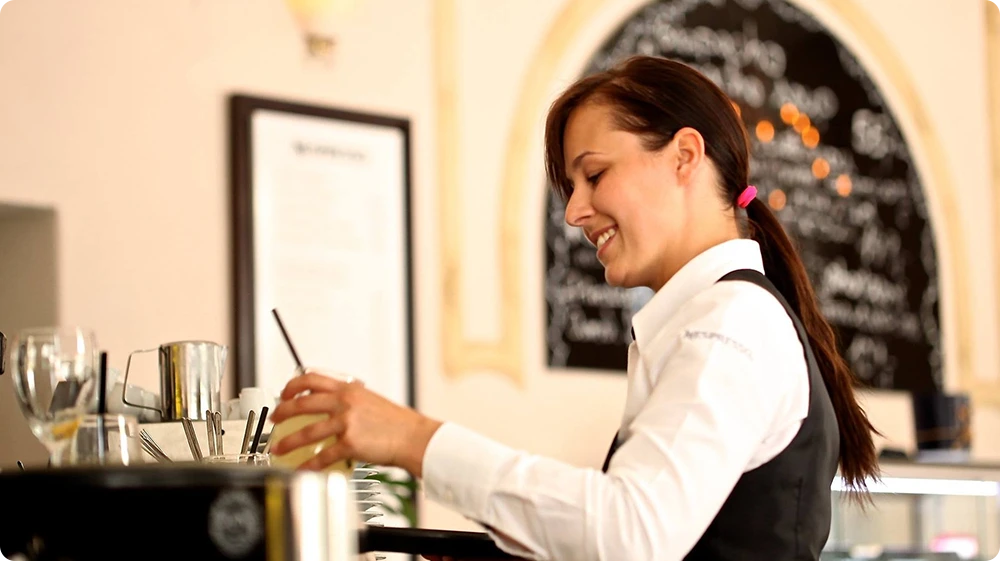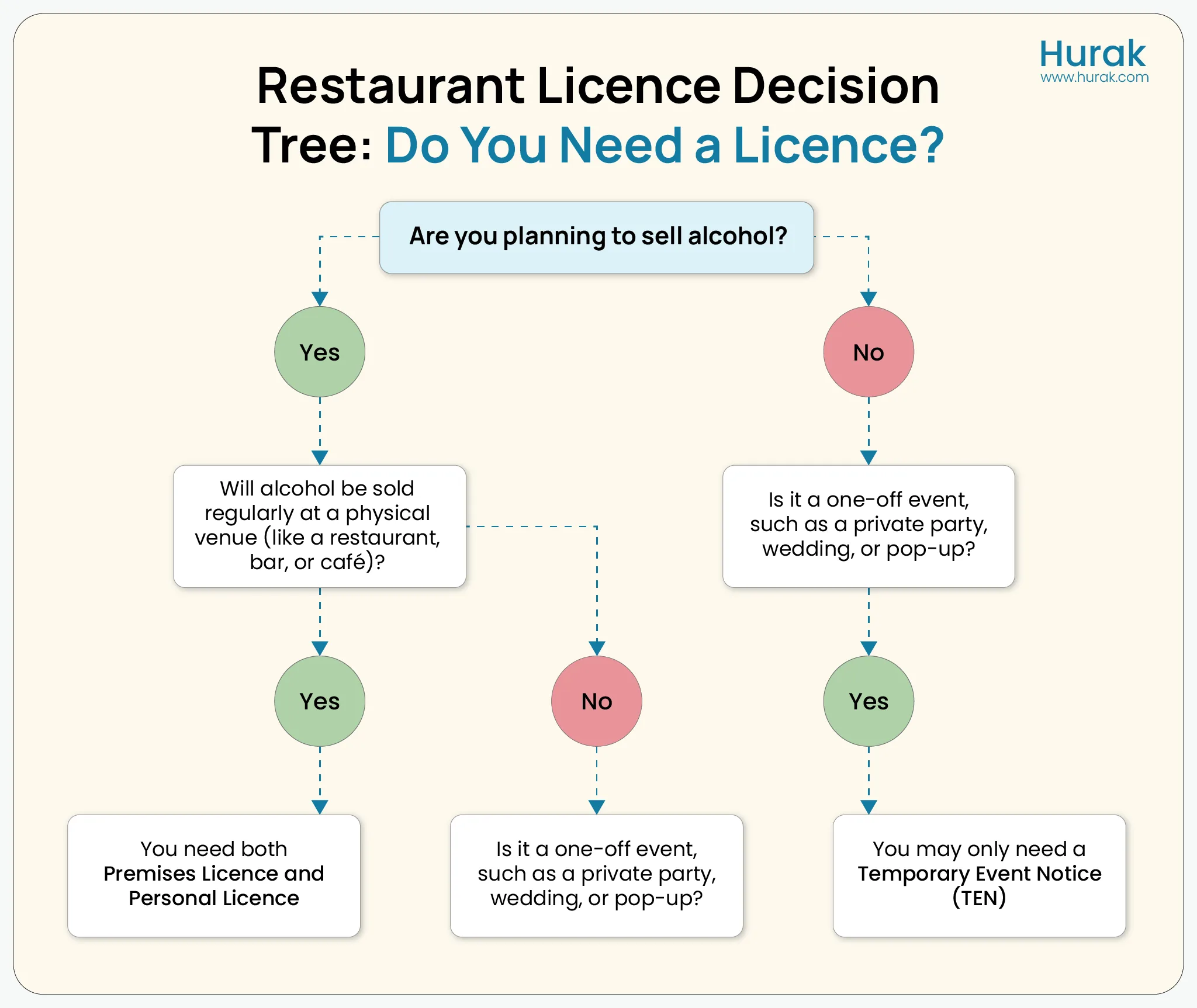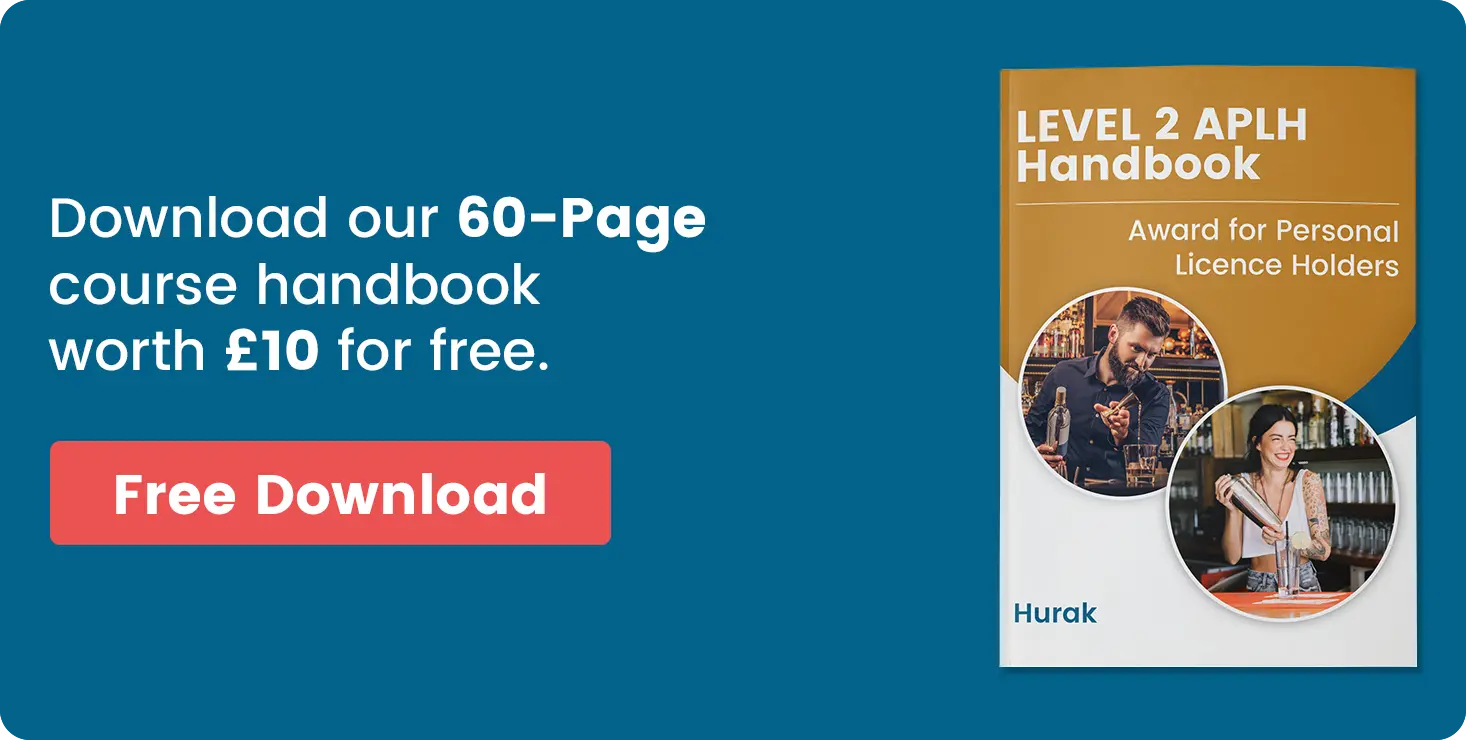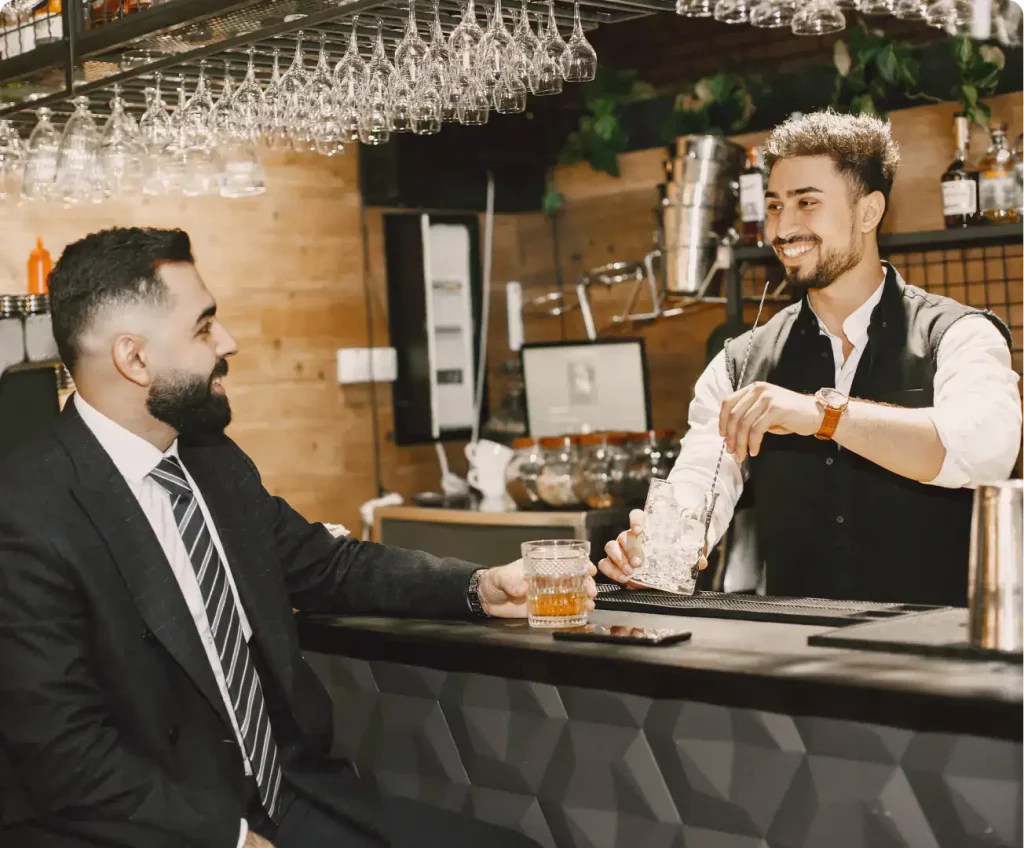
If you plan to sell alcohol in your restaurant, pub, or café, you’ll need the proper licences in place. Without them, you could face serious consequences.
Many business owners don’t realise that there isn’t just one catch-all alcohol licence. In most cases, you’ll need two: a Premises Licence for your business location, and a Personal Licence for the individual responsible for supervising alcohol sales.
And once you’re licensed, you’re also legally required to purchase alcohol only from HMRC-approved suppliers to stay compliant with alcohol laws.
This guide will walk you through everything you need to know about what licences you need, how to apply, who can sell alcohol, and your ongoing responsibilities as a licence holder.
Do Restaurants Need a Liquor Licence to Sell Alcohol?
Before diving into the details, here’s a quick decision tree to help you understand what kind of alcohol licence your restaurant might need. This simple flowchart will guide you based on whether you regularly sell alcohol, host a one-time event, or are still unsure about your approach.

This visual guide simplifies what can often feel like a confusing process. In short:
If your restaurant plans to sell alcohol regularly, even alongside food, you’ll need both a Premises Licence and a Personal Licence. The Premises Licence covers your business location, while the Personal Licence allows a designated individual to oversee alcohol sales legally.
However, if you’re only planning to sell alcohol at a one-off event, such as a private dinner or pop-up, a Temporary Event Notice (TEN) may be sufficient. This licence is faster and simpler to obtain, making it ideal for short-term or occasional alcohol sales.
To understand the key differences between a Personal Licence and a Premises Licence, read our detailed comparison guide.
For short-term events, explore our complete guide to Temporary Event Notices (TENs).
What Is a Designated Premises Supervisor (DPS)?
The Designated Premises Supervisor (DPS) is the person who oversees alcohol sales in your restaurant. They must hold a valid Personal Licence. The DPS ensures that you follow the law and serves as your primary point of accountability.
Manage Alcohol Sales Legally and Confidently
If you’re planning to serve alcohol at your restaurant, you’ll need to be named as the Designated Premises Supervisor (DPS). That means getting your Personal Licence is essential.
At Hurak, we guide you through the process step by step, making it simple, fast, and stress-free.
Step 1: Complete the Level 2 APLH Course
This government-recognised training gives you the legal knowledge to sell alcohol responsibly and apply for your Personal Licence.
Step 2: Apply for Your Personal Licence
After passing the course, you can submit your application to your local council. Hurak also offers a full licence application service to make this even easier.
Once you’re licensed, you can be named as a DPS and legally manage alcohol sales at your restaurant.
Learn more about what a DPS is and why every licensed premises must have one.
How to Apply for a Restaurant Liquor Licence
Applying for a Premises Licence
To apply for a restaurant liquor licence, also known as a Premises Licence, you’ll need to follow a few key steps through your local council. First, you must submit an application that includes details like your restaurant’s layout, proposed opening hours, and a full list of alcohol-related activities you plan to carry out. Accurate floor plans of the premises must also accompany this application.
Once submitted, you are legally required to display a public notice outside your restaurant for 28 consecutive days. This provides members of the public and responsible authorities, such as the police, with an opportunity to raise objections if necessary. You’ll also need to notify the police and other relevant authorities directly when applying.
Applying for a Personal Licence
To apply for a Personal Licence, you’ll first need to complete the Award for Personal Licence Holders (APLH). This course helps you understand alcohol laws and your responsibilities. After completing the course, you must pass a DBS check to show you don’t have any serious criminal convictions.
Once you have both of these, you can submit your application to your local council along with the necessary documents and fee.
Download our Personal Licence (APLH) Test Prep Book for free!
×
What Happens If There Are Objections?
During the 28-day notice period, individuals or authorities (such as the police or local residents) can raise concerns about noise or public nuisance, crime or disorder, and underage drinking.
If there are objections, your council may hold a hearing to decide the outcome. Learn how test purchasing alcohol checks can influence this.
How Long Does It Take to Get a Restaurant Liquor Licence?
The time it takes to get a restaurant liquor licence depends on your local authority and how quickly you provide the correct documents.
A Premises Licence, which the restaurant itself needs, usually takes around 4 to 8 weeks to process. Alongside that, a Personal Licence, typically required for the person supervising alcohol sales, can take 2 to 4 weeks.
These timelines can overlap if you’re applying for both at the same time, but delays can occur if information is missing or if your council has a backlog.
How Much Does a Restaurant Alcohol Licence Cost?
Getting licensed to sell alcohol isn’t free, but the fees are fairly straightforward. A Personal Licence, which is required for the person supervising alcohol sales, costs £37 to apply for. You’ll also need to complete a basic DBS check, which adds an extra £18 to the total.
The cost of a Premises Licence, which is the licence your restaurant or café needs, depends on the rateable value of your property. You’ll need to pay both an initial application fee and an annual renewal charge. The higher the rateable value, the higher your licensing costs will be.
Want help figuring it all out? Let Hurak Handle It for You
Hurak can handle both your personal licence and premises licence applications from start to finish.
Here’s the Simple 3-Step Path to Running Your Pub or Restaurant:
✅ Step 1: Complete Your APLH Training
Start with the mandatory APLH course, where you’ll learn UK alcohol laws, responsibilities, and safe service.
✅ Step 2: Let Hurak Apply for Your Personal Licence
We’ll manage your personal licence application, including the DBS check, forms, and council paperwork.
✅ Step 3: We’ll Handle Your Premises Licence Too
Opening a licensed venue? Hurak can also assist with your Premises Licence application, ensuring you’re fully ready to operate.
Let Hurak guide you through the licensing process simply, clearly, and without stress.
Can You Sell Alcohol While Waiting for Your Licence?
No, unless you have a Temporary Event Notice.
TENs allow you to sell alcohol for up to 7 days and are ideal for one-time events or while waiting for approval. TENs are also used for mobile setups. Click here for our guide on Mobile Alcohol Licences
Licence Renewal, Changes, and Duration
Unlike many other licences, a Premises Licence does not expire, which means you won’t need to renew it regularly. However, if you make changes to the business, such as altering the layout of your restaurant or introducing new licensable activities, you’ll need to update the licence through a variation application.
Similarly, a Personal Licence also doesn’t expire, but if you move home or change your name, you must inform your local council. You can read more about how long a personal licence lasts and your responsibilities as a licence holder.
If your restaurant appoints a new Designated Premises Supervisor (DPS) or you want to adjust your opening hours, you’ll need to apply for a licence variation. Keeping your licence details accurate and up to date is essential to stay compliant with alcohol licensing laws.
Reasons for Licence Refusal or Suspension
A restaurant liquor licence can be refused, suspended, or even revoked if certain conditions aren’t met. Common reasons include having convictions for relevant offences, such as those related to violence, drugs, or dishonesty.
If you repeatedly break licensing conditions, like selling alcohol outside of approved hours or serving underage customers, this can also put your licence at risk.
Additionally, if there are serious complaints about your premises, especially those involving public safety or nuisance, your local authority may take action.
To understand more about licence suspension, click here for our guide on reasons why your Personal Licence can be suspended.
What Time Can Restaurants Serve Alcohol?
Most licensed restaurants serve alcohol between 10am and 11pm, but you can request other hours. This depends on your Premises Licence terms.
Click here to learn more about what time you can buy alcohol in the UK.
Special Rules in Scotland
If your restaurant is in Scotland, licensing laws are governed by the Licensing (Scotland) Act 2005. You’ll need a Scottish Personal Licence. Learn more in our guide to getting a Personal Licence in Scotland.
Based in Scotland? We’ve Got You Covered.
If you’re running a restaurant or bar in Scotland, your licensing requirements are different from the rest of the UK. At Hurak, we offer:
- Scottish Certificate for Personal Licence Holders (SCPLH) – mandatory to apply for a personal licence in Scotland
- Refresher Training – required every 5 years to keep your licence valid
- Guidance on the Licensing (Scotland) Act 2005
Conclusion
To legally sell alcohol in your restaurant, you need a Premises Licence and a Personal Licence. The Designated Premises Supervisor (DPS) must hold a Personal Licence, and the premises must follow all conditions set out by your local council. You must display a public notice, allow time for objections, and may face delays if there are concerns. You also need to keep your licence up to date and follow rules on who can be served and when.
Whether you’re opening a small bistro or a full-scale dining venue, understanding the restaurant alcohol licensing process is essential. Use this guide and the resources linked to ensure you stay compliant and serve responsibly.
Hospitality Training That Works Around You
Whether you’re managing a venue or just starting in the industry, Hurak offers a wide range of certified hospitality courses to help you succeed.
Our courses are flexible, affordable, and fully online options are available.
FAQs
Do I need a Personal Licence to serve alcohol in my restaurant?
Yes, at least one person must hold a Personal Licence to authorise the sale of alcohol on the premises. Learn how to get a personal licence in our step-by-step guide.
Can I sell alcohol at a one-off event without a Premises Licence?
Yes, you can apply for a Temporary Event Notice (TEN) instead. This is ideal for pop-ups, private parties, or short-term events. Read more in our TEN guide.
How much does a restaurant liquor licence cost in the UK?
The cost of a Premises Licence depends on your venue’s rateable value. You’ll also need to pay an annual fee, due each year on the anniversary of your licence being granted.
What’s the difference between a Personal Licence and a Premises Licence?
A Premises Licence allows alcohol to be sold from a specific location, while a Personal Licence authorises an individual to supervise those sales. See our full explanation on the difference between personal and premises licences.
Do I need to renew my licence?
Personal Licences no longer expire, but you must notify your local authority if your details change. Premises Licences also don’t expire, but need updating if you change the layout or activities.
What is a Designated Premises Supervisor (DPS)?
A DPS is the person named on the Premises Licence who is responsible for authorising alcohol sales. This person must hold a Personal Licence. Find out more in our post on what a DPS is.
What happens if I break licence conditions?
You risk your licence being suspended or revoked. This can occur in cases of serious breaches, safety issues, or criminal offences. Learn more about the reasons your Personal Licence can be suspended.




